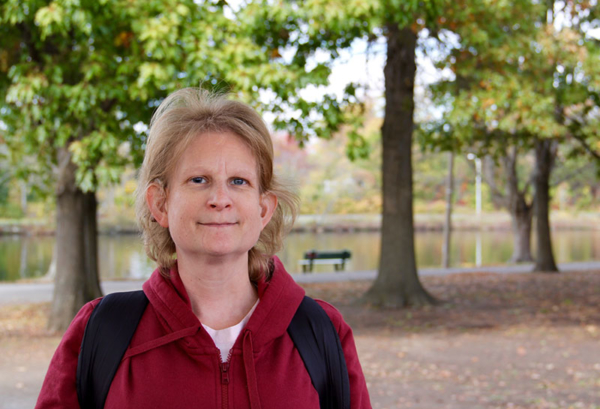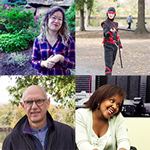Faces Behind the Screen: Liz Copy
RESOURCES
<< Return to all “Faces Behind the Screen” stories
“Everybody thinks that accessibility means wheelchairs,” says Liz, who we met at the 2016 Walk4Hearing.
Liz is a property manager with a background in social work. She lives in Brighton, MA and is a member of the Hearing Loss Association of America (HLAA) Boston Chapter. Stories from her life remind us that, despite what we may perceive, not everyone has the same hearing abilities and that alternative sensory aid should be made a priority in every public space.
Liz has progressive sensorineural loss which began around the age of 9, the result of chemotherapy treatment for childhood cancer. The chemotherapy caused an ototoxic hearing loss in her left ear and, many years later, in her right ear, too.
From Liz’s perspective, however, it was most certainly for the best.
For my parents to make the choice of having that drug and knowing that it was probably going to cause hearing loss, I’m still glad that they chose it, because… it really did help. It really did help after two relapses. So, I’m grateful to be alive.
“My science teacher was [showing] a movie. The entire curriculum was based on a movie with no captions.”
It wasn’t always easy, though, Liz says, growing up with both cancer and hearing loss. During middle school, she normally had to sacrifice her free period to learn how to lip-read although she says she is forever grateful she did so.
Liz didn’t have any access to individualized education programs (IEPs) back then, and her school wasn’t always prepared to accommodate her, she tells us.
My science teacher was [showing] a movie. The entire curriculum was based on a movie with no captions. And he pretty much told the whole class that I was deaf or had a hearing loss when I was not there. Without my permission.
…I think he was expecting my classmates to save me rather than try to figure out other ways of helping me through the curriculum.
Federal laws like the Rehabilitation Act of 1973 and the Americans with Disabilities Act of 1990 have helped a lot to make the world more accessible to tens of millions of Americans who require reasonable accommodations to enjoy an equivalent standard of living. However, even today there is still some confusion as to which entities are supposed to provide those accommodations and in what capacity — even from government entities, themselves.
I got called into jury duty two years ago. When I got there, they had — they claim they have everything — they had nothing. They kept bringing me out infrared [hearing devices, which are not compatible]. I said, no. I have the amplification. I need clarification. And it was the oldest court in Suffolk County. Courtroom… nothing.
…I had hearing aids at that time with a [wired] streamer with a microphone. So, I gave the microphone to the lawyer. But if you give the lawyer the microphone, then the witness doesn’t have it. I’m going back and forth, back and forth.
“When I was little, I thought [Sade’s] “Smooth Operator” was “Oolasperella”…”
Taken aback by the unpreparedness and lack of proper accommodations in the courtroom, Liz wrote a letter to the court’s head of accessibility. In the letter, Liz disclosed that she wasn’t sure if she was able to hear 100% of what the lawyer and the witness were saying, which eventually found its way to and drew concern from the judge. Shortly thereafter she was summoned to meet with the judge and lawyers. The judge said, “You know, not everybody makes it through jury duty,” and implied that she has had to let go of jurors who were not absorbing information properly in the court.
I had to stand up for myself, and I shared that story of, well, I can’t promise you 100%. I have a severe hearing loss. When I was little, I thought [Sade’s] “Smooth Operator” was “Oolasperella,” and they all cracked up. And then I was just like, I’m a social worker. I’m always looking for a better environment, and a way to make things better so I can do my part. And they decided to keep me on the jury.
Liz told us that even in her own church she met pushback when asking for better hearing aid compatibility with the building’s FM loop system, although they were quick to accommodate after she wrote them a letter. You always have to fight, she says.
Even when they think they have good systems, and they do, you have to teach them and you have to be an [educator]. I think we’ve come a long way, but it is exhausting.
…I think it’s important to try to have a conversation. Everybody is a little bit different. Everybody has different types of hearing loss. Everybody has a good ear, a bad ear. Or, I know someone says, “Please look at me, speak slowly…”
…So, just take the time to say, “Hey, you mind telling me a little bit about hearing loss? How can I help you?”
Still, Liz tells us, sometimes it gets to be depressing and very frustrating when you don’t hear. Before the age of widespread texting, messaging apps, and video chat technology, cell phones were not accessible to Liz at all.
“Hearing loss is sometimes invisible, and don’t assume that just because someone gets a hearing aid or CI [implant] that it’s fixed…”
I never used phones. I was so isolated, and everybody’s on the phone every hour. You’re on the bus at 7:00 in the morning, people are on their phones. It was not a vehicle for me to be able to use.
These days cell phones are much smarter and people can use them to communicate in countless ways even if they cannot hear. And on the captioning front, things have become much better since Liz’s middle school days.
I do feel, for the most part, [technologies] have been more and more accessible. I only go to the movie theater when the movie theater has either the rear view window [cup-holder captioning device] or the goggles… I only go if there are captions.
Technology has certainly improved and the world, in many ways, at least, has become more accessible for people who are deaf and hard of hearing. But Liz reminds us that, just because technology can considerably improve one’s hearing abilities or even conceal one’s inability to hear, it is no permanent fix to hearing loss or an excuse to forget about accessibility.
Hearing loss is sometimes invisible, and don’t assume that just because someone gets a hearing aid or CI [implant] that it’s fixed — because we are still deaf or hearing impaired. [The technology is] a miracle, but at the same time don’t assume that it’s going to fix it.
—
A huge ‘thank you’ to the Hearing Loss Association of America (HLAA) for hosting this series of interviews at the New England Walk4Hearing in Fall of 2016.
Faces Behind the Screen is a storytelling project focusing on members of the Deaf and hard of hearing community.




